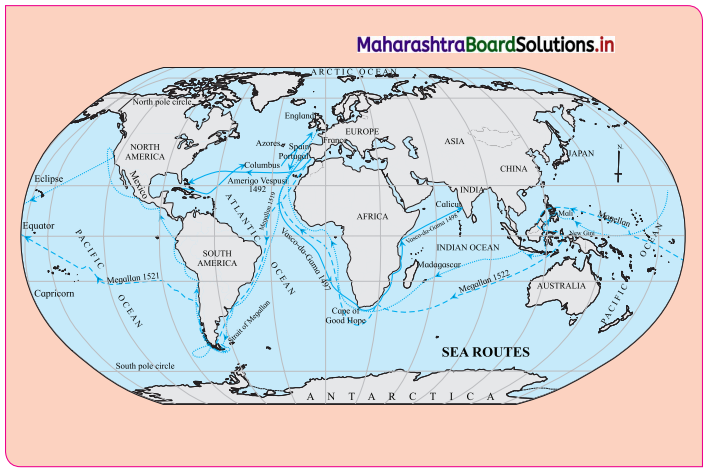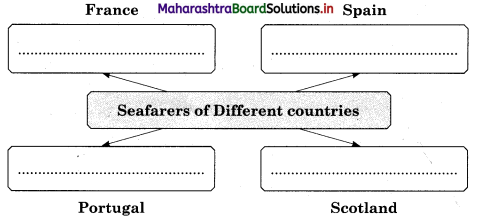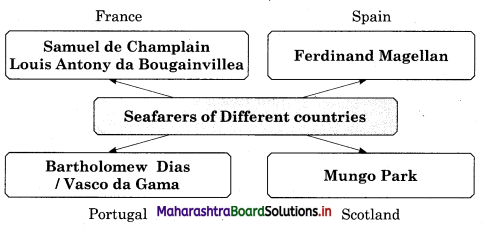Balbharti Maharashtra State Board Class 12 History Important Questions Chapter 1 Renaissance in Europe and Development of Science Important Questions and Answers.
Maharashtra State Board 12th History Important Questions Chapter 1 Renaissance in Europe and Development of Science
1A. Choose the correct alternative and rewrite the statement.
Question 1.
__________ means ‘Rebirth’.
(a) Reformation
(b) Renaissance
(c) Revival
(d) Rejuvenation
Answer:
(b) Renaissance
Question 2.
The first crusade began in the year __________
(a) 1096
(b) 1097
(c) 1098
(d) 1099
Answer:
(a) 1096
![]()
Question 3.
__________ is said to have mentioned the sunspots (Tamas Kilakas) in his treatise ‘Brihatsamhita’.
(a) Ibn Batuta
(b) Varahamihir
(c) Alberuni
(d) Arya Bhatt
Answer:
(b) Varahamihir
Question 4.
Edmund Cartwright invented the __________
(a) telescope
(b) printing press
(c) steam engine
(d) power loom
Answer:
(d) power loom
Question 5.
__________ invented the steam engine.
(a) James Watt
(b) Thomas Bell
(c) Robert Fulton
(d) George Stephenson
Answer:
(a) James Watt
Question 6.
__________ landed at the port of Calicut in 1498.
(a) Ferdinand Magellan
(b) Vasco da Gama
(c) Capt. James Cook
(d) Mungo Park
Answer:
(b) Vasco da Gama
![]()
Question 7.
__________ is considered to be the father of ‘Hydraulics’.
(a) Ibn Batuta
(b) Amir Khushrow
(c) Alberuni
(d) Abul Fazl
Answer:
(c) Alberuni
1B. Find the incorrect pair from group ‘B’ and write the corrected one.
Question 1.
| Group ‘A’ | Group ‘B’ |
| (a) Galileo | Telephone |
| (b) Thomas Bell | Cylinder for printing |
| (c) Robert Fulton | Steamboat |
| (d) George Stephenson | Steam engine for transport |
Answer:
Galileo – Telescope
Question 2.
| Group ‘A’ | Group ‘B’ |
| (a) Marco Polo | India |
| (b) Amerigo Vespucci | Venezuela |
| (c) Samuel de Champlain | Quebec |
| (d) Mungo Park | Western Africa expedition |
Answer:
Marco Polo – China
2A. Write the names of historical places/persons/events.
Question 1.
Two cities considered holy by Jews, Christians, and Muslims
Answer:
Jerusalem and Bethlehem
Question 2.
Sultan of Egypt who defeated the crusaders by conquering Jerusalem
Answer:
Sultan Saladin
![]()
Question 3.
The highest authority of the Catholic Church
Answer:
The Pope
Question 4.
The first printing press was started by
Answer:
Johannes Gutenberg
Question 5.
Author of the epics ‘Iliad’ and ‘Odyssey’
Answer:
Homer
Question 6.
The King who gave trading permission to Vasco da Gama
Answer:
Zamorin
Question 7.
The book written by Louis Antony da Bougainvillea
Answer:
Voyages Around the World
Question 8.
The methodology used in Zoology to classify animals is called
Answer:
Taxonomy
2B. Choose the correct reason from those given below and complete the sentence.
Question 1.
The ‘Medieval’ Period is called ‘Renaissance’ because __________
(a) it saw advances in various fields of life
(b) people wanted change
(c) the rulers imposed restrictions on their thinking
(d) people were tired of fighting wars
Answer:
(a) it saw advances in various fields of life
![]()
Question 2.
The ‘Crusades’ was a failure because __________
(a) the Pope and the rulers initiated the wars for their own vested interests
(b) common people losing faith
(c) there was a rift between the Pope and the European rulers
(d) of all of the above reasons
Answer:
(d) of all of the above reasons
Question 3.
The European colonies in the African continent increased because __________
(a) Europeans wanted to settle in Africa
(b) it was rich in diamonds, gold, and copper
(c) the cold climate of Europe made them migrate to Africa
(d) Human labour was very expensive in Europe
Answer:
(b) it was rich in diamonds, gold, and copper
Question 4.
Industrial revolution took place in England because __________
(a) the atmosphere was suitable for the industrial revolution in England
(b) the other nations were weak to compete with England
(c) mechanized production did not take place in the other nations
(d) England wanted to prove her superiority
Answer:
(a) the atmosphere was suitable for the industrial revolution in England
3A. Observe the map on textbook page 05 and answer the questions based on it.

Question 1. Name the ocean that lies in the northern hemisphere.
Answer:
The Arctic
Question 2.
Name the ocean that lies in the southern hemisphere.
Answer:
The Antarctic
![]()
Question 3.
Who circumnavigated the earth?
Answer:
Ferdinand Magellan
Question 4.
In which continent lies the Cape of Good Hope?
Answer:
Africa
Question 5.
Where did Vasco da Gama land in India in 1498?
Answer:
Calicut (Kozhikode)
Question 6.
After whom is ‘America’ named?
Answer:
Amerigo Vespucci
3B. Complete the following concept map.
Question 1.
| Inventors | Inventions |
| Galileo | ……………………………. |
| ………………………. | Power Loom |
| James Watt | …………………………… |
| ………………………. | Spinning Mule |
Answer:
| Inventors | Inventions |
| Galileo | Telescope |
| Edmund Cartwright | Power Loom |
| James Watt | Steam Engine |
| Samuel Crompton | Spinning Mule |
Question 2.

Answer:

4. Write Short Notes.
Question 1.
Inventions and Discoveries during the Renaissance period.
Answer:
- In 1543 C.E., Nicolaus Copernicus told the world that the centre of our planetary system is the ‘Sun’ and not the ‘Earth’.
- In 1609, Galileo prepared a sophisticated telescope that supported the theories propounded by Copernicus and Kepler.
- This facilitated research in physical sciences.
- Inventions of gunpowder and printing brought about changes in the techniques of warfare and dissemination of knowledge.
- In the world of printing, the first printing press was started by Johannes Gutenberg in 1440 and the first printing press started in Italy in 1451.
![]()
Question 2.
Roman Church.
Answer:
- In the pre-renaissance period, the Roman church not only controlled the religious life of the people but also the individual life.
- It exploited the common people in the following ways-
- By issuing mandates for payments of fees.
- Put restrictions on free-thinking and its circulation.
- Anyone who dared to interpret Bible was sentenced to death.
- The humanist philosophy was instrumental in making a ground for resistance against the powerful church.
Question 3.
Ibn Batuta.
Answer:
- He was a sailor and a famous medieval traveler.
- Ibn Batuta visited several countries like India, Maldives, Sumatra, China, Spain, Sardinia, East, and West Africa.
Question 4.
Alberuni.
Answer:
- accompanied Sultan Mahmud of Ghazni during his visit to India.
- tried to estimate the diameter of the earth.
- determined the latitudes and longitudes accurately.
- prepared a map of the earth indicating its round shape.
- considered as the father of ‘Hydraulics’.
5. Explain the following statements with reasons.
Question 1.
The rise of ‘Economic Nationalism’ was an outcome of the industrial revolution.
Answer:
- Arresting the growth of rival nations along with pursuing the growth of one’s own nation became important.
- Putting economic restrictions on rival nations by devising ways.
- For e.g. Prohibiting the import-export transactions of other countries, levying heavy toll duties on their goods, establishing colonies mainly in Asia and Africa, and fighting with the natives were part of the economic nationalism.
- Thus, economic nationalism led to imperialism.
Question 2.
The number of European colonies in the African continent increased.
Answer:
- The continent was rich in diamonds, gold, and copper.
- It was also rich in fertile land, timber, and forests.
- Later the Portuguese captured them and sold them as slaves.
- Cheap human labour was the need of the Europeans.
- This increased the demand for African slaves and helped them to expand the slave trade.
![]()
Question 3.
Galileo is known as the ‘Father of Empirical Sciences’.
Answer:
- Galileo established the rational method of empirical observation and forming a theory based on those observations.
- He proved that the speed of objects of different weights falling down is equal by carrying out actual demonstrations from the heights of the tower of Pisa in Italy.
- He triggered a revolution with his modified telescope which benefited the seafarers to a large extent.
- With his telescope, he discovered four major satellites of the planet Jupiter.
- He proved that there are mountains and valleys on the moon and the light emitted from it are actually the rays of the sun.
- He also calculated that the sun takes 27 days to complete one cycle around itself.
- He was also the first scientist to observe spots on the sun.
- Hence, Galileo is known as the ‘Father of Empirical Sciences’.
6. State your opinion.
Question 1.
Scientific inventions in various fields.
Answer:
- The compass, the barometer, telescope, and the thermometer were invented during this period.
- Microscopes were invented to observe various types of micro-organisms.
- Robert Boyle, an alchemist discovered that that the absolute pressure and the volume of a gas are inversely proportional.
- The research in physics was more focused on heat and sound.
- In zoology, a methodology known as ‘Taxonomy’ was developed to classify animals.
- Benjamin Franklin’s research was on lightning and electricity. He coined many technical terms which are used in science even today.
Question 2.
Galileo is known as the ‘Father of Empirical Sciences’.
Answer:
- Galileo established the rational method of empirical observation and forming a theory based on those observations.
- He proved that the speed of objects of different weights falling down is equal by carrying out actual demonstrations from the heights of the tower of Pisa in Italy.
- He triggered a revolution with his modified telescope which benefited the seafarers to a large extent.
- With his telescope, he discovered four major satellites of the planet Jupiter.
- He proved that there are mountains and valleys on the moon and the light emitted from it are actually the rays of the sun.
- He also calculated that the sun takes 27 days to complete one cycle around itself.
- He was also the first scientist to observe spots on the sun.
- Hence, Galileo is known as the ‘Father of Empirical Sciences’.
![]()
Question 3.
In the pre-renaissance period, the Roman Church controlled both the religious as well as the individual life of the people.
Answer:
- In the pre-renaissance period, the Roman church not only controlled the religious life of the people but also the individual life.
- It exploited the common people in the following ways-
- By issuing mandates for payments of fees.
- Put restrictions on free-thinking and its circulation.
- Anyone who dared to interpret Bible was sentenced to death.
- The humanist philosophy was instrumental in making a ground for resistance against the powerful church.
7. Answer the following questions in detail.
Question 1.
Write a detailed note on the industrial revolution in England.
Answer:
‘Industrial Revolution’ indicates the transition from manual production to mechanized production.
- In England, the atmosphere was suitable for the industrial revolution.
- Large amounts of iron ore and coal were available.
- The humid climate of England was suitable for producing yarn.
- These conditions proved to be favourable for the textile industry in England.
- England had also established a large number of colonies by then so England could obtain raw material at cheap rates from these colonies.
- England could also export the processed goods and sell them in their colonies with large profit margins using their navy.
- The availability of cheap labour made it possible for them to maintain an optimum level of costs.
- These factors prepared the ground for the industrial revolution in England thus giving a boost to its economy.
- Because of the above reasons Industrial revolution first began in England.
8. Answer the following questions with the help of given points.
Question 1.
Discuss the scientific inventions that took place in the following fields.
(a) Textile Industry
(b) Metallurgy
Answer:
(a) Textile industry:
- In the year 1738, John Kay made and patented the ‘flying shuttle’ which increased the speed of weaving.
- The ‘spinning jenny’, a spinning frame with multiple spindles were made by James Hargreaves in England. It reduced the amount of labour and time of production.
- In the year 1769, Richard Arkwright made a more advanced spinning frame. It could produce yarns much faster.
- Samuel Crompton invented the ‘spinning mule’ in 1779 C. E..This machine increased the speed of producing cloth two hundred times.
- In 1785, Edmund Cartwright invented the power loom.
- In 1793, a machine called the ‘cotton gin’ was introduced. This machine separated cotton seeds from cotton fibres at a greater speed.
(b) Metallurgy:
- England had a number of iron mines.
- Therefore, it was necessary to advance the technique of smelting iron to acquire purified iron from it.
- The fuel for iron furnaces was replaced from wood to coal.
- Special machines were made to keep the furnaces at a set temperature and to maintain their aeration.
- In 1865, the process of producing steel from molten iron was invented and the nature of the iron industry underwent a major transformation.
- At about the same time, a method was adopted to pour the molten metal into casts for making iron bars (e.g. rails).
![]()
Question 2.
Give an account of the geographical discoveries made by the following explorers
(a) Marco Polo
(b) Henry the Navigator
(c) Bartholomew Dias
(d) Christopher Columbus
Answer:
(a) Marco Polo: An Italian traveller who introduced China and other Asian countries to Europe. He stayed at the royal court of Kublai Khan where he studied Mongolian and Chinese languages.
(b) Henry the Navigator: He was the prince of Portugal in the 15th century. He encouraged people to carry out expeditions which resulted in the discovery of ‘Madeira’ and ‘Azores’, two archipelagos near Africa. These are the autonomous regions of Portugal. The Portuguese transported the African people to Portugal and sold them as slaves. The Portuguese also brought African gold with them.
(c) Bartholomew Dias: Dias began his expeditions on the orders of the king of Portugal, John II. He reached the southern tip of Africa which he named the Cape of Storms. Later on, the name was changed to ‘Cape of Good Hope. He was the first to circumnavigate the African continent.
(d) Christopher Columbus: The eastern sea route was closed to the Europeans and it became necessary to search for an alternative trade route to reach Asia. With the help of King Ferdinand and Queen Isabel of Spain, Christopher Columbus, an Italian explorer set sail in search of India. He, however, reached the islands near America instead of India.